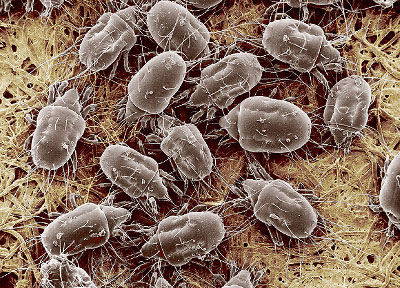Psorinum
Psorinum
Origin
Scabies mite, or Sarcoptes scabiei, eats into the skin to lay eggs. Its saliva is highly irritating, causing fluid-filled blisters on the skin. This fluid is used for the remedy.
Background
Transmitted via skin contact, scabies is highly contagious and found worldwide. It is treated by applying insecticide lotion to the entire surface area of the skin.
Preparation
Fluid is drawn by syringe from a scabies blister on the skin of an infected person. It is sterilized, dissolved in purified water, then diluted and succussed.
Common Names
Scabies.
Scabies mite, or Sarcoptes scabiei, eats into the skin to lay eggs. Its saliva is highly irritating, causing fluid-filled blisters on the skin. This fluid is used for the remedy.
Background
Transmitted via skin contact, scabies is highly contagious and found worldwide. It is treated by applying insecticide lotion to the entire surface area of the skin.
Preparation
Fluid is drawn by syringe from a scabies blister on the skin of an infected person. It is sterilized, dissolved in purified water, then diluted and succussed.
Common Names
Scabies.

SCABIES MITE
Once the female mite has eaten her way into the skin, she lays eggs that hatch and cause infestation.
Key Symptoms
despair and pessimism; sense of being forsaken; chilliness; offensive-smelling discharges; constant hunger- In Latin, scabere means "to scratch." From this is derived the name of the scabies mite, which tunnels into the skin and causes an itchy, blistering infection. Hahnemann believed that scabies infection reflected a more deepseated, underlying disease, or "miasm," in his patients, which could be revealed and healed by treatment. He proved the homeopathic remedy, Psorinum, from a "nosode" of the infection, although it was not published until it was re-proved by Hering in 1831. Psorinum is given mainly for skin, bowel, and respiratory tract complaints.
Remedy Profile
There is characteristically an anxious, rather unambitious air to those for whom Psorinum is best suited. They are prone to feeling somewhat abandoned, forsaken, and pessimistic.Lack of stamina is a typical trait. These people generally possess weak constitutions, proving easy prey to infections and viruses. Recovery from any illness is slow. Often worse in wintry weather, they tend to feel the cold sharply, even in summer, wrapping up to avoid a chill since it aggravates their symptoms, but they can also feel worse for strong heat. Despite a huge appetite, they are usually thin. They have an increased sense of well-being just before the onset of illness, but when ill are prey to morbid fears that they will not recover.
Skin, bowel, or respiratory tract disorders are the primary conditions for which Psorinum is prescribed, generally when the underlying vitality is poor.
Skin conditions
Symptoms: Pus-filled pimples, crusting, scaly eruptions, or itchy, blistered patches of skin. The skin always looks dirty, even after cleansing. Pimples are often pus-filled acne, appearing on the face, neck, scalp, and hairline. Prevalence is especially common in teenagers (acne vulgaris) and middle-aged women (acne rosacea). Scaly eruptions are typically due to eczema, producing large areas of weeping skin or itchy, scaly patches of skin that may blister and are prone to infection and suppuration, producing a foul-smelling yellow discharge.Symptoms better: For washing; for warm clothing.
Symptoms worse: For overheating from exertion.
Diarrhea
Symptoms: Diarrhea with spasmodic abdominal cramps, and a strong appetite but no weight gain. If accompanied by a distended abdomen, excessive flatulence, and a feeling of incomplete evacuation during bowel movements, symptoms may indicate irritable bowel syndrome (IBS), and may also include bouts of constipation. Stools are foul-smelling, fluid, gushing, dark, and bloody. Accompanying symptoms may include a headache, and mucus and a burning sensation in the rectum.Symptoms better: For moderate temperatures.
Symptoms worse: For cold; for heat; in the early morning; for coffee.
Respiratory illness
Symptoms: Recurrent acute respiratory infections with offensive-smelling catarrh and breathlessness. Sinus infection is common, as is bronchitis or a cough accompanied by great fatigue. Symptoms typical of the hay fever and asthma that may respond to Psorinum are coughing, breathlessness, and wheezing, often exacerbated by exercise or cold weather. There may be an associated eye or ear infection.Symptoms better: For moderate temperatures; for lying on the back with the arms outstretched and head low.
Symptoms worse: For cold; for open air; for cold drinks.
Eye & ear infections
Symptoms: Painful styes with yellow pus, or an eye infection such as conjunctivitis, which causes inflamed eyelids and a yellowy discharge. Ear infections such as otitis media or otitis externa may also be helped by the remedy if there is a foul-smelling discharge.Symptoms better: For moderate temperatures.
Symptoms worse: For cold; for open air.
Depression
Symptoms: Profound fear of personal failure, poverty, and death, with a pessimistic belief that life holds no promise. Feelings of intense loneliness and abandonment may lead to despair and suicidal thoughts.Symptoms better: For warm surroundings; for eating.
Symptoms worse: For cold; for coffee.
© 2024 KnowHomeopathy | All rights reserved